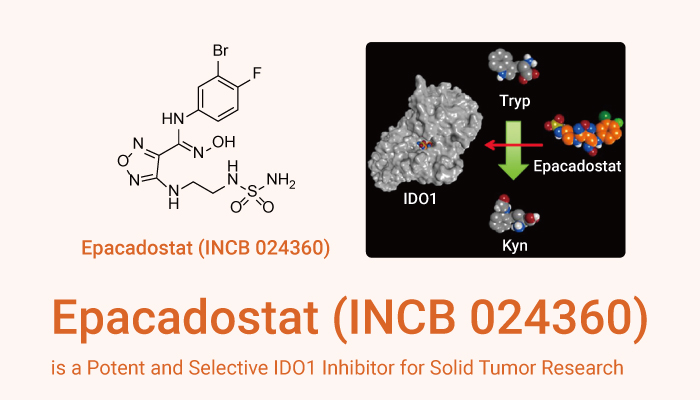Scientists find a potent and selective indoleamine 2,3-dioxigenase 1 (IDO1) inhibitor epacadostat through a series of SAR studies. It primarily focused on improving the PK by reducing the rate of glucuronidation while maintaining cell potency. Forthermore, it takes a data-centric medicinal chemistry approach. And the molecular structure of epacadostat contains several previously unknown or underutilized functional groups in drug substances, including a hydroxyamidine, furazan, bromide, and sulfamide.
Ultimately, epacadostat proved to be efficacious in rodent models of melanoma and well-tolerated in preclinical IND toxicology studies. Epacadostat in combination with anti-PD1 mAb, pembrolizumab, is currently being tested in a pivotal trial for the treatment of patients with unresectable or metastatic melanoma.

Epacadostat (INCB 024360) is a potent and selective IDO1 inhibitor with an IC50 of 71.8 nM.
First, in cellular assays, Epacadostat (INCB 024360) selectively inhibits human IDO1 with IC50 values of approximately 10 nM, demonstrating little activity against other related enzymes such as IDO2 or tryptophan 2,3-dioxygenase (TDO). Second, epacadostat also exhibits significant activity toward mouse IDO1, with an IC50 value of 52.4 nM, in a similar assay using mouse IDO1-transfected HEK293/MSR cells.
In vivo, female Balb/c mice bearing CT26 tumors are treated orally twice daily for 12 d with Epacadostat at 100 mg/kg. Then, epacadostat suppresses kynurenine equivalently in plasma, tumors, and lymph nodes. Furthermore, in na ve C57BL/6 mice, 50 mg/kg epacadostat decreases plasma kynurenine levels within 1 hour and those levels stay at least 50% suppressed through the 8-hour time course.
In summary, Epacadostat is a potent and selective IDO1 inhibitor for solid tumor research.
Reference:
[1] Liu X, et al. Blood. 2010 Apr 29;115(17):3520-30.
[2] Koblish HK, et al. Mol Cancer Ther. 2010 Feb;9(2):489-98.